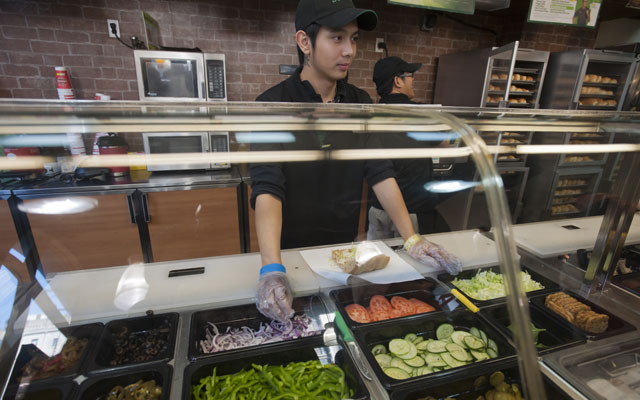In what most would consider a foolish class action lawsuit and a glaring example of what is broken in our tort system, Subway was recently accused of fraudulent marketing practices related to its well-known “footlong” sandwiches.
The plaintiff, Barry Gross, filed suit against the Doctor’s Associates-owned chain of Subway in his home state of Illinois. In his complaint, Gross claims that after seeing repeated advertising for their “footlong” subs, he purchased one on January 23, 2013, but discovered that the sandwich was shorter than 12 inches in length. Mr. Gross decided to air his grievance over this dough shortage by filing a federal lawsuit in the U.S. District Court for Northern Illinois. Similar class action lawsuits against Subway are also pending in New Jersey and California.
In the wake of this sandwich controversy, Subway issued a press release saying, “We freshly bake our bread throughout the day in our more than 38,000 restaurants in 100 countries worldwide, and we have redoubled our efforts to ensure consistency and correct length in every sandwich we serve.”
But as the company also said, and anyone with any common sense would realize, “The length of the bread baked in the restaurant cannot be assured each and every time as the proofing process may vary slightly each time in the restaurant.”
It is yet to be seen if these cases will gain any traction in our courts, but the “scandal” did garner the attention of one popular comedic television host. In a recent segment on Stephen Colbert’s show, he cleverly relays the details as a “corporate scamwich” and charges that we, the American public, have been “five-dollar foot-wronged.” This farcical satire does much to highlight the absolute absurdity of this lawsuit.
But these types of frivolous lawsuits are not isolated or unusual incidents. Our civil justice system is plagued with similar lawsuits that usually result in exorbitant settlements, which subsequently end up lining the pockets of trial lawyers with little money going to any actual “victims.”
This past summer, the Ninth Circuit Court of Appeals actually ruled against a similar class action lawsuit filed against the Kellogg Company that claimed Kellogg’s falsely advertised that a breakfast of Frosted Mini-Wheats helped improve children’s attentiveness. But there are clinical studies that show that kids who eat breakfast (like Frosted Mini-Wheats) have better attentiveness in school than kids who skip breakfast. That is just commonsense to any responsible parent and another example of an abusive lawsuit that was fortunately stopped by a federal court.
While Kellogg’s legal battle had a victorious ending, many don’t. American businesses constantly face the potential threat from these types of petty complaints that can last for years and cost companies dearly. The tort industry costs America over $800 billion every year, only a small fraction of which goes to compensating actual victims. To reduce costly and unnecessary lawsuits and ensure the integrity of our civil court system, real tort reform is needed that will deter frivolous lawsuits over the amount of dough in a sandwich.
































